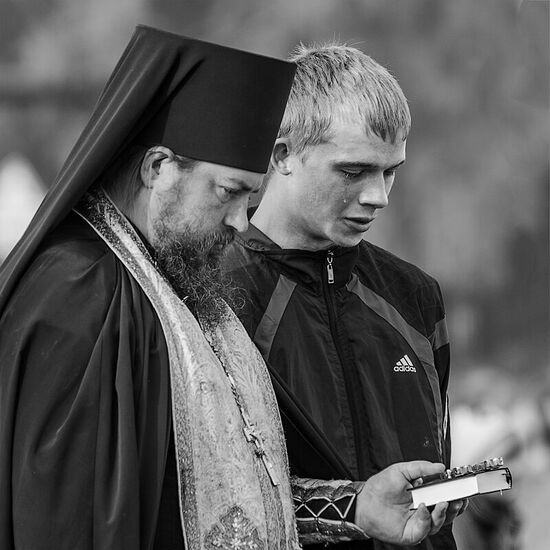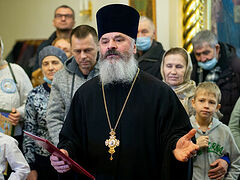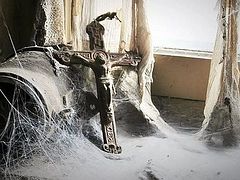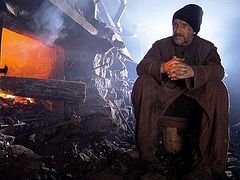Back on the Sunday after Theophany, we heard a short Gospel reading from Matthew about how Christ came to Galilee when he learned that St. John the Forerunner was taken and imprisoned. The Lord’s public ministry to mankind thus begins, and we hear His first sermon. When did it come? When Christ heard the news of the suffering of His saint—of the greatest of those born among women. The Lord hadn’t gone to Galilee before that; He gave the Forerunner the chance to fulfill his ministry—Prepare ye the way of the LORD, make His paths straight (Is. 40:3, Lk. 3:4). And now, when the Forerunner is taken, when the Sun of Righteousness—Christ—rises, all the stars and the moon disappear. We have before us only the Lord.
He comes to this land to show that people who listen to the preaching of repentance are never abandoned by God. And when the worthiest of men are taken from them, the Lord sends others, even better ones, or He comes Himself. His Church is never forsaken. He Himself comes and recalls the words of the Prophet: The people which sat in darkness saw great light; and to them which sat in the region and shadow of death light is sprung up (Is. 9:2, Mt. 4:16).
This light is called great because it comes from His good news. And He is above the light that was before, in the Law, which reveals the natural good—life according to conscience and shame. The light that Christ reveals is a great, all-surpassing light. It reveals the depths of the eternal mysteries of God, and it reaches far, through all the ages. It will shine brighter, this light. What Christ says is the beginning, the dawn of a new day, and it will grow until there comes the day when the Church exclaims: This is the day which the LORD hath made; let us rejoice and be glad in it (Ps. 117:24)—the Lord’s Pascha—in the fate of every man and in the history of the entire human race.
People—all those who are without Christ—are in darkness. They are darkness themselves, and they are sitting in darkness. They may be active, be whatever kind of ascetics they like, but they’re sitting in darkness. Every man has the condition of one sitting in darkness, with no real hope of ever getting out. People are in darkness because they love the darkness more than the light. Why do they love the darkness more than the light? Because their works were evil, and they’re afraid to come to the light. But if a man hates the evil he does, then the light proclaimed by Christ is revealed to him as salvation.
Repent ye, says the Lord, for the Kingdom of Heaven is at hand (Mt. 3:2). He says the same words as the Forerunner when he went out to preach. The preacher of truth doesn’t seek new words. He seeks truth. He repeats the words already said before Him, but now they’re suddenly revealed at a new, infinitely greater depth.
The Kingdom of God is at hand—this is the basis for repentance. And the closer the Kingdom of Heaven to us, the closer the end of the world, the more the darkness thickens in the world, the greater the repentance to which the Lord calls His Church, all of mankind, every one of us.
And how can we repent if we have no repentance? Didn’t the Lord Himself say: No man can come to Me, except the Father Which hath sent Me draw Him (Jn. 6:44)? But the Lord also said: Come unto Me, all ye that labour and are heavy laden (Mt. 11:28)—laden with the many sorrows of this life, the greatest of which are the sorrows of sin. Him that cometh to Me I will in no wise cast out (Jn. 6:37), He says. Anyone who hates the darkness, who turns to the Lord, He accepts. Only by the gift of Christ, by His grace is there genuine repentance. But it’s revealed to the measure that man desires the light and strives for it. This union of the perfect, good will of God with the will of man seeking the light, is the mystery of repentance. As the Holy Fathers say, by this union, the wall that separates man from God, which is death, and death eternal, is torn down. The strength of this wall is in all our sins, headed by pride, with the refusal to repent.
True repentance is given only to the baptized. Yes, Baptism should be preceded by repentance, as the Forerunner precedes Christ—by man’s awareness that there is good and evil, that the main thing in man is his conscience, his life according to the truth accessible to him. But true repentance begins when a man is baptized, when he is imprinted with the Divine light—his entire being, both body and soul, and all the members of his body. This light judges a man’s life, and in the light of God a man measures everything that happens to him, and he thereby acquires repentance.
Whoever doesn’t repent, even if he’s baptized, is in fact as one unbaptized. The gifts that he received are unto his judgment and condemnation. It would be better for him to be unbaptized than to have received this gift of the light and live without repentance, without striving for the perfection revealed in the God-Man Christ.
But when a man repents, he learns the joy of repentance. St. Isaac the Syrian says that many, especially when they start out on the path to Christ, learn the meaning of the words: Blessed are they that mourn: for they shall be comforted (Mt. 5:4). This is the gift of tears that the Lord gives the soul, because the grace of God penetrates into the depths of human nature. And these are tears of joy, tears in which there is hope that all the promises of God will be fulfilled.
We must see that there are really no such tears that could wash away our sins. Not even the slightest sin can be destroyed by even our greatest efforts, because death is present in even the smallest sin, and death is eternal. It’s possible only by the gift of Christ, by the grace that acts in a man, uniting with his free will, which chooses the good.
Repentance and Baptism are the one mystery of our whole spiritual life. From the very beginning, the Church of Christ was wondrously blessed by God because people received Baptism. How it overflowed with grace, with the extraordinary gifts of the Holy Spirit, because people were baptized! And how it was imprinted with the seal of faith—by martyrdom, animating the entire human race. And now, perhaps, the Church is living in expectation of a new era, of a new, yet more spiritually rich period of its history—a period of repentance, which will yield neither to the ancient times, renowned for martyrdom, nor to recent times when so many martyrs shone forth in our Church, led by the Royal Martyrs. The meaning of their martyrdom is to lead all men to repentance, when the glory of God would be revealed with power hitherto unknown.
Satan knows about it, and so all his efforts are directed towards there being no repentance, so there would be no need for it. To do this he has to establish sin as the norm in the mass consciousness, so people wouldn’t be afraid of sin. Which will win—the grace of God or the devil, as he seems to be winning now? Or, thanks to the repentance we manifest, as people already knowing Baptism and the grace of Baptism and repentance, will some amazing, wondrous changes take place?
May none be ashamed, no matter what has happened to them, to return to the Good Shepherd, Who will always joyously receive them, so the glory of the Cross may triumph over the dishonor of sin, to glorify the mercy of God, of which the Lord has enough for every sinner.
Of course, the world doesn’t notice a man who repents. It’s as if nothing has changed in the world. But it’s a great celebration in Heaven when a man truly repents, as though it were the noblest, worthiest thing of all on earth. And it really is! He who repents, even if it’s only one person, is more in line with God’s plan for the human race than all the other worthiest people who seem to have no need of repentance. He’s more in line with the plan for the salvation of sinners, revealed in the Pre-Eternal Council, in the Revelation of the Lamb of God Who takes away the sins of the world. Such a man accepts the fruits of the Tree of Life, the fruits of the Cross of Christ, and receives the sanctification of God.
So great is the gift of repentance that the Holy Fathers, all ascetics from the most ancient times, seeing repentant harlots and tax collectors entering the Kingdom of God first, as Christ Himself says, started to offer such repentance as though they were harlots and tax collectors themselves—as though they were worse than all, good for nothing. And they were so successful in this that many started thinking that repentance is for the saints; but as for us—we please God above all by our good deeds. They forget that everything is exposed in the sight of God, and that there is nothing good in man, as the Lord Himself says: There is none that doeth good, no, not one (Ps. 52:4), and all our righteousness is like the dirty clothes of a harlot, as the Prophet says (Is. 64:6).
When a man is given repentance, when he confesses with one mouth together with the entire Church before the Chalice of Christ: “… sinners, of whom I am first,” when he sees the horror of his sins, he knows that it is only by the Blood of Christ that he can become righteous and cleanse himself from all impurity. A new life opens up to him, where there is no place for sin, and he hears the voice of the Savior, that the Kingdom of God is at hand, and is already now in the hearts of those who truly repent.




